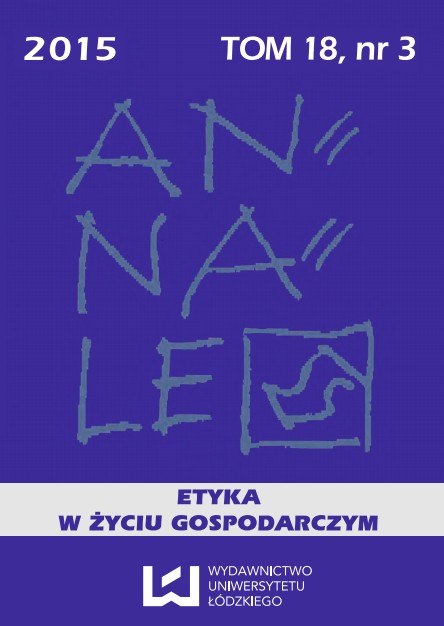Problematyka etyczna w pierwszych dziełach o rachunkowości
DOI:
https://doi.org/10.18778/1899-2226.18.3.06Słowa kluczowe:
accounting, ethics, history of accountingAbstrakt
Accountants recently had the opportunity to celebrate 20 years of existence in Poland the regulating of accounting. The act was adopted by parliament in 1994. 500 years before the treaty about double accounting was reprinted by Pacioli. The edition of Tractatus XI. Particularis de computis et scripturis was an (epic) epoch-making event designating the beginning of a new field of economic sciences. The idea of the double accounting was known before, not only because of Pacioli, but also through Cotruglio, who described it 36 years earlier. Recently in accounting, as well as in the broadly understood economy, there is a particular emphasis put on ethics, moral values and professional attitudes. It is worth considering whether and on what scale they were present in the early works of Accountancy 550 years ago, how their representatives approached the subjects the beginning of a written history of accounting. The article presents the main ideas included in the guidelines Pacioli and Cotruglio regarding double accounting, and identifies if ethical guidelines were presents among others guidelines. It turns out that the author of the essential work in the history of accounting, as well as its predecessor, devoted much attention to the moral attitude of the merchant, his appropriate behavior, attitude towards customers and other people, with whom he has a business relationship.Bibliografia
Banaszkiewicz A., Techniki prowadzenia ksiąg rachunkowych w ujęciu historycznym, „Copernican Journal of Finance & Accounting” 2013, vol. 2, issue 1.
Google Scholar
DOI: https://doi.org/10.12775/CJFA.2013.002
Dobija M., Ponadczasowe i cywilizacyjne znaczenie zapisu podwójnego, „Management and Business Administration. Central Europe” 4/2012 (117), s. 3-22.
Google Scholar
DOI: https://doi.org/10.7206/mba.ce.2084-3356.19
Dobija M., D. Dobija, O naturze kapitału, http://janek.uek.krakow.pl/~zkrach/pobranie.htm
Google Scholar
Dobija M., Ewolucja koncepcji rachunkowości, kapitału i pieniądza, http://janek.uek.krakow.pl/~zkrach/pobranie.htm
Google Scholar
Dobija M., M. Jędrzejczyk, Szkice z historii rachunkowości, PTE, Kraków 2011.
Google Scholar
Hońko S., Luca Pacioli – prekursor dydaktyki w rachunkowości, „Folia Pomeranae Universitatis Technologiae Stetinensis” 2013, Oeconomica 303 (72), 41-50.
Google Scholar
Mikuła-Bączek E., Kapitał a kapitał ludzki w procesie kształtowania wymiaru globalizacji [w:] Nierówności społeczne a wzrost gospodarczy. Problemy globalizacji i regionalizacji, cz. 1, zeszyt nr 8, red. M.G. Woźniak, Uniwersytet Rzeszowski, Rzeszów 2006, s. 155-169.
Google Scholar
Niemczyk L., Program badawczy Luca Paciolego, „Gospodarka Narodowa” 9/2010, s. 83- 96.
Google Scholar
DOI: https://doi.org/10.33119/GN/101171
Pacioli L., Traktat o rachunkowości, SKwP, Warszawa 2007.
Google Scholar
Pogodzińska-Mizdrak E., Przedmowa [w:] L. Pacioli, Traktat o rachunkowości, SKwP, Warszawa 2007.
Google Scholar
Rogozina S., Powstanie i rozwój księgowości podwójnej, „Zeszyty Wyższej Szkoły Bankowej w Poznaniu” 2012, vol. 32, s. 69-87.
Google Scholar
Turzyński M., O średniowiecznej moralności kupieckiej i etyce zawodowej rachunkowości: perspektywa teorii społecznej Michela Foucaulta, „Zeszyty Teoretyczne Rachunkowości” 2013, vol. 73 (129), s. 131-146.
Google Scholar
DOI: https://doi.org/10.5604/16414381.1075560
Ziętowska I., Benedetto Cotruglio i pierwsze dzieło o teorii rachunkowości, „Zeszyty Teoretyczne Rachunkowości” 2014, vol. 79 (135), s. 179-197.
Google Scholar
DOI: https://doi.org/10.5604/16414381.1133397
Pobrania
Opublikowane
Jak cytować
Numer
Dział
Licencja

Utwór dostępny jest na licencji Creative Commons Uznanie autorstwa – Użycie niekomercyjne – Bez utworów zależnych 4.0 Międzynarodowe.









